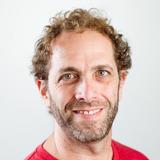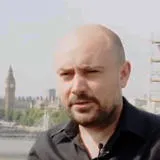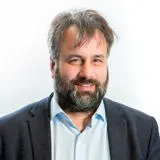Having done my PhD at Princeton under Professor Gross's supervision, it was especially meaningful for me to host him here at King's. He demonstrated an incredible energy throughout his talk and in his conversations at our workshop, which is reflective of the fundamental role he and Quantum Chromodynamics play in theoretical physics to this day."
Nadav Drukker, Professor of Theoretical Physics, Department of Mathematics
30 May 2023
“When theorists ask something you don't know, try something new” - Nobel laureate inspires at annual Higgs Lecture
Professor David Gross was awarded the Nobel Prize for Physics in 2004 for seminal contributions to theoretical and particle physics
At the invitation of the Faculty of Natural, Mathematical and Engineering Sciences (NMES), on 18 May Professor David Gross gave a lecture on the history of Quantum Chromodynamics (QCD) to a packed out crowd to celebrate the theory’s 50th anniversary.
Professor Gross is the Chancellor’s Chair Professor of Theoretical Physics at the Kavli Institute for Theoretical Physics in Santa Barbara, California and is most known for discovering a key property of QCD, known as “asymptotic freedom”. This property helped turn QCD into the accepted model for the strong nuclear force, and is the basis for his 2004 Nobel Prize.
Gross first began researching the interaction between quarks, elementary particles that are held together to form larger particles, and protons and neutrons (subatomic particles made from quarks) in Jerusalem, then Berkley, then Princeton, where he taught he supervised Professor of Theoretical Physics Nadav Drukker's PhD.
50 years of Quantum Chromodynamics: The Theory of The Strong Nuclear Force
Following an introduction from the Executive Dean of NMES, Mark French, and Nadav, Professor Gross took the audience on a whirlwind tour of particle physics. Starting from Ernest Rutherford’s 1911 theory of the atomic nucleus, he went on to explore the evolving history of quantum mechanics and how QCD can overcome some of the challenges associated with other modes of thought in theoretical physics such as quantum field theory.
Recounting the dominance of experimental physics in the 1950s and 60s, Professor Gross said that “There were an incredible amount of experiments back then, with new experiments, new discoveries, new particles, and new patterns being discovered every week”.
Yet it was only in 1968, thanks to the Stanford Linear Accelerator Center – an electron accelerator – which proved quarks were real, that the founding rule to QCD could be established. This states that when the distance between two particles gets shorter, the way they interact gets weaker.
He finished on a positive note, looking forward to the tide of new experiments pushing the envelope of discovery. He cited the use of QCD in probing the inner workings of neutron stars and nuclei, and how this work may improve our understanding of nuclear physics and some of the mysteries of the universe: “So that’s the end, but not really. Not the end of QCD.”
The inaugural Higgs Lecture was delivered in December 2012 by its name bearer, Professor Peter Higgs, who returned to King's after graduating in 1950 with a first-class honours degree in Physics, and who famously predicted the Higgs Boson particle. The lecture is now held annually by NMES, with Nobel Laureate Professor Sir Roger Penrose presenting the lecture in 2022.
It was a real pleasure to have Professor Gross speak to us at King’s; he joins a host of seminal figures from 20th century Physics including Peter Higgs and Gerard ‘tHooft. QCD is responsible for most of the massive objects in the universe, and it was a privilege to have Professor Gross to explain the history being this most fundamental theory."
Malcolm Fairbairn, Professor of Physics, Department of Physics



